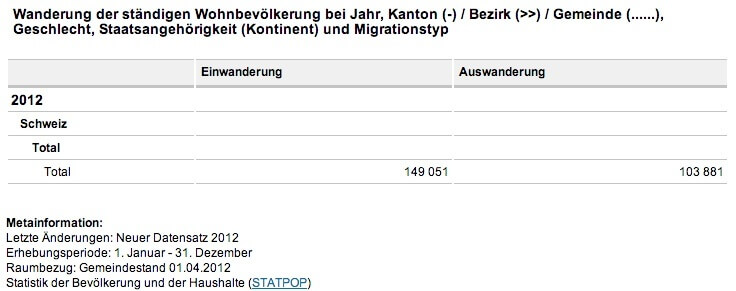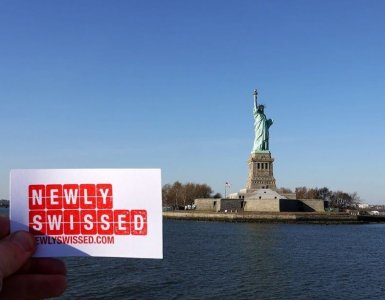
And in more recent history, Switzerland has adopted the credit system of American universities. In turn, ObamaCare, the current president's law to socialize the country's health care, is said to be loosely based on Switzerland's system.
The Transient Issue of Immigration
Now we appear to be at the brink of another milestone in history where the sister republics must peek over each other's shoulders. The topic is on immigration. Undeniably, the prosperity of both republics' economies depends on a net immigration flow.
While the United States prides itself as a "Nation of Immigrants" - Switzerland, not so much. At least not officially. However, statistics show that in 2012, the Alpine republic had a net immigration of 45'170. In other words, more people received some form of residency than left the country.
Differences Abound
Despite the cooperation on a policy level, there are stark differences between the way Switzerland handles immigration compared to the United States. One reason is simply due to geography: In terms of sheer size, Switzerland would fit in the state of Kansas twice! In terms of total border length, Switzerland has a mere 1'899 km, while the United States shares some 12'000 km of borders with its neighbors.

Meanwhile, the U.S. maintains stricter enforcements. Back in the day, immigration could be more easily handled as newcomers entered through one of just a few ports. But today, the far stretched borders with Canada and Mexico pose a more difficult task.
Finally, any major changes in immigration policy require a popular vote in Switzerland - such as this weekend's. In the United States, immigration policies are decided not on a local or state level, but by the national government.
As has been the case in the past months in the U.S., any major changes to a - let's be honest - broken immigration policy have been stalled by the Republican party. In order to implement a more moderate policy which would grant eventual residency to those who have been living in the country illegally, a spark of direct democracy à la Switzerland might help.
Uncertain Impact of the Immigration Vote on Swiss Economy

Switzerland narrowly approves plan for immigration quotas, with 50.5% of voters backing plan to end agreement with EU http://t.co/zzaVaoxrYT
— BBC Breaking News (@BBCBreaking) February 9, 2014
On many accounts, the current Swiss immigration policy was far from broken. But now, the federal council and the parliament will need to come up with an alternative, including annual immigration caps and limits on working permits.
Sure, the procedure of setting those limits is normal in many other countries, so hopefully politicians will find a balance where immigration can be maintained at a healthy level. As Swiss Justice Minister Simonetta Sommaruga has indicated, a framework geared towards quality rather than quantity might be the golden goose. For instance, Canada rewards educational achievements, language skills, or work experience in a point system.
As for Swiss foreign relations, especially with the surrounding partners of the European Union, this change in direction could prove to be disastrous - or challenging at best. The European Union has indicated that should Switzerland enable immigration caps for EU citizens and therefore cancel out the bi-lateral agreement, cooperation on an economic level (including exports) could be harmed.
(This post is inspired by the opinion piece "Migration policy debates in the USA and Switzerland" by Drew Keeling, which was translated to German for Tages-Anzeiger; photograph copyright by Keystone)





I’ve lived in Switzerland and it’s insurance is not at all what we have to suffer here with Obama Care.
The usa has more illegal immigrants who pay nothing into our system – no taxes, no healthcare, free schooling for their children, and the list goes on – We seriously need to take care of this problem first and foremost. The same job performed by a US citizen doesn’t provide enough money after taxes and insurance and childcare costs. While illegals can work, provide for themselves and still have money to send back to their native country. It’s pathetic. Learn from our mistakes. We need a better more streamlined way to allow people to immigrate and become productive for ALL.
As a Naturalised Swiss (living in Switzerland), who has lived in America, Canada, Germany, France, UK, Austria, etc the entire immigration debate is missing one very very crucial component; namely there are two tracks to immigration.
The deal between the EU and Switzerland is closer to the NAFTA deal that exists between Canada and the US. With NAFTA Canadians, and Americans have very different immigration entrance requirements and they are without limits. I call these the friendly neighbour visas which abound in many places throughout the world.
The problem with the friendly visa’s is that they open the markets and these days subject the countries to a globalised competition. This is real debate in Switzerland not the number of foreigners. I first moved to Switzerland in 1995 and Switzerland was very different then. It was a sleepy country where things literally shutdown at 17:00 during the week, and 12:00 on Saturdays. The high wages were supported by a financial industry that used certain techniques to attract the rich and wealthy.
The country was simpler, but it was also limited in its choices related to daily life. Fast forward to 2014 (nearly 20 years later) and Switzerland has become a globalised country where you can actually have a nightlife. BUT that has a price and this is the price that some Swiss said no to. A nightlife implies that Swiss companies have external competition, and people have wage pressures because others can do the same job for quite a bit less. Case in point; Fust (Swiss) vs MediaMarkt (German).
In other words the problem of Switzerland is that its economy which was inefficient and shielded became efficient and unshielded. It has disheartened many Swiss, and made them longingly look back to the good old days. Once people do that you are asking for trouble as the past always looks rosier than it was. I have already lived through this in Canada when NAFTA was introduced and saw the exact same reactions.
We Swiss like to believe we can negotiate with the EU. The problem is two-fold. First the EU of 1995 is not the EU of 2014. Many of my countryfolk believe the EU will collapse and die. I believe to the contrary. I was born in Germany and saw how the EU has changed, and the EU will not die. It will only strengthen, but it does not mean adjustments are not appropriate. We Swiss are still of the mindset of 1995, remembering what we want to remember.
The EU might agree to the changes in immigration policies, but only with their pound of flesh. And it is here where I become very concerned. For the EU is going to dismantle whatever advantages we have.
All I can say now is that most likely within 10 years we will be in the EU. AND that is not what I wanted. I like the bilateral approach it has and should have served us well! While many like to point out that democracy sucks, I say no it works, but sometimes things take a bit longer to figure out.
Thanks for your insightful view on current events, Christian! You’ve really put Sunday’s vote into perspective.
[…] fact, the recent passing of the Einwanderungsinitiative with 50.3% of the 49% voter turnout means that actually only about […]